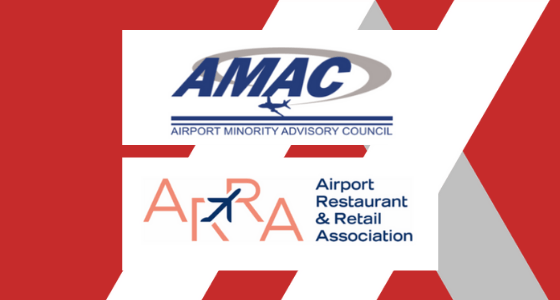Flexibility is key in making sure small businesses survive the current upheaval, says Vernon Evans, board member, Dallas/Fort Worth International Airport (DFW). Speaking on the weekly industry call sponsored jointly by the Airport Restaurant & Retail Association (ARRA) and the Airport Minority Advisory Council (AMAC), Evans says DFW is focused on helping.
“We’ve been working hard to be as flexible as possible to assist those businesses in their survival – I think [the answer is] flexibility, flexibility, flexibility,” Evans said. “We must work closely with the staff to understand how we can support the ACDBEs and small businesses as we go forward. We at DFW have an entire department devoted to supporting the small and minority-owned businesses as they go forward. We provide training, we provide networking and we’re committed to seeing that these businesses be successful.”
Atlanta City Councilman Andre Dickens, another guest speaker on the call, said minority-owned businesses are “extremely critical” for both the city and the airport. He noted that about 41 percent of concessions contracts are held by ACDBE-certified firms.
“In an effort to remain the best that we can be, we will continue to increase and expand our ACDBE programs,” Dickens said, noting the need to create opportunities and to ensure staff and leadership of the airport reflect the diverse cultural landscape of Atlanta. “This is just important to us as a culture, as a society,” he said.
At Hartsfield-Jackson Atlanta International Airport (ATL), concessionaires were offered a three-year lease extension, a move that allowed the contract longevity needed for businesses to seek loans to weather the crisis, Dickens said.
“Hopefully that did allow them to get some funding…to get some cashflow support,” he said. But he added that the airport has to weigh needs of current concessionaires with the street-side businesses that have been planning to seek to do business in the airport and now will have to wait longer for contracts to be put out for bid.
Dickens stressed the need to keep seeking solutions “even though it’s taxing mentally and physically,” and noted the airport’s actions create waves across the state.
“The changes that we make impact over 60,000 workers across 200 plus concessionaire businesses,” he said. “We’re aware that this is huge, what we’re doing at this airport has Georgia’s largest employer. With some of the things that we put in place, other employers see it and hear it, and they take heed … and then they’re able put it in their practices. From time to time, we take things from them, but being the largest employer in the state, we set the tone for some of those activities.”
Evans noted that a second coronavirus wave is expected, which could further tamp down air travel. He noted that concessionaires are attending airport board meetings and soliciting help. “We are looking at some other things that we can do,” he said.
“It’s going to take all of us pulling together and supporting one another to get through this pandemic,” he added. “In these unprecedented times I would say it’s more critical than ever for us to stay in tune with the changing needs of our customers and make the smart decisions that are required.”






